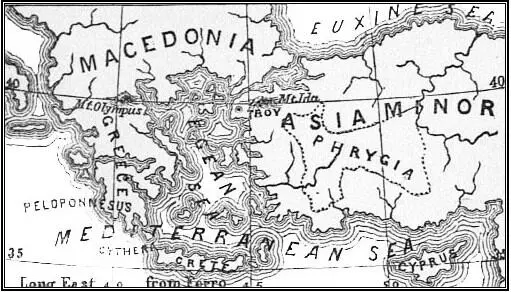Jacob Abbott - Romulus
Здесь есть возможность читать онлайн «Jacob Abbott - Romulus» — ознакомительный отрывок электронной книги совершенно бесплатно, а после прочтения отрывка купить полную версию. В некоторых случаях можно слушать аудио, скачать через торрент в формате fb2 и присутствует краткое содержание. Жанр: foreign_antique, foreign_prose, Историческая проза, на английском языке. Описание произведения, (предисловие) а так же отзывы посетителей доступны на портале библиотеки ЛибКат.
- Название:Romulus
- Автор:
- Жанр:
- Год:неизвестен
- ISBN:нет данных
- Рейтинг книги:3 / 5. Голосов: 1
-
Избранное:Добавить в избранное
- Отзывы:
-
Ваша оценка:
- 60
- 1
- 2
- 3
- 4
- 5
Romulus: краткое содержание, описание и аннотация
Предлагаем к чтению аннотацию, описание, краткое содержание или предисловие (зависит от того, что написал сам автор книги «Romulus»). Если вы не нашли необходимую информацию о книге — напишите в комментариях, мы постараемся отыскать её.
Romulus — читать онлайн ознакомительный отрывок
Ниже представлен текст книги, разбитый по страницам. Система сохранения места последней прочитанной страницы, позволяет с удобством читать онлайн бесплатно книгу «Romulus», без необходимости каждый раз заново искать на чём Вы остановились. Поставьте закладку, и сможете в любой момент перейти на страницу, на которой закончили чтение.
Интервал:
Закладка:
Chapter III.
The Story of Æneas.
B.C. 1200
Story of Æneas remained long unwritten.
Besides the intrinsic interest and importance of the facts stated in the last chapter, to the student of history, there was a special reason for calling the attention of the reader to them here, that he might know in what light the story of the destruction of Troy, and of the wanderings of Æneas, the great ancestor of Romulus, which we now proceed to relate, is properly to be regarded. The events connected with the destruction of Troy took place, if they ever occurred at all, about the year twelve hundred before Christ. Homer is supposed to have lived and composed his poems about the year nine hundred; and the art of writing is thought to have been first employed for the purpose of recording continuous compositions, about the year six hundred. The story of Æneas then, so far as it has any claims to historical truth, is a tale which was handed down by oral tradition, among story-tellers for three hundred years, and then was clothed in verse, and handed down in that form orally by the memory of the reciters of it, in generations successive for three hundred years more, before it was recorded; and during the whole period of this transmission, the interest felt in it was not the desire for ascertaining and communicating historic truth, but simply for entertaining companies of listeners with the details of a romantic story. The story, therefore, can not be relied upon as historically true; but it is no less important on that account, that all well-informed persons should know what it is.
Mother of Æneas.
Her origin.
The mother of Æneas (as the story goes), was a celebrated goddess. Her name was Aphrodite; 2 2 Pronounced in four syllables, Aph-ro-di-te.
though among the Romans she afterward received the name of Venus. Aphrodite was not born of a mother, like ordinary mortals, but sprang mysteriously and supernaturally from a foam which gathered on a certain occasion upon the surface of the sea. At the commencement of her existence she crept out upon the shores of an island that was near, – the island of Cythera, – which lies south of the Peloponnesus.

Origin of Venus.
Early history of Venus.
Her magical powers.
She was the goddess of love, of beauty, and of fruitfulness; and so extraordinary were the magical powers which were inherent from the beginning, in her very nature, that as she walked along upon the sands of the shore, when she first emerged from the sea, plants and flowers of the richest verdure and beauty sprang up at her feet wherever she stepped. She was, besides, in her own person, inexpressibly beautiful; and in addition to the natural influence of her charms, she was endued with the supernatural power of inspiring the sentiment of love in all who beheld her.
Her children Eros and Anteros.
From Cythera the goddess made her way over by sea to Cyprus, where she remained for some time, amid the gorgeous and magnificent scenery of that enchanting island. Here she had two children, beautiful boys. Their names were Eros and Anteros. Each of these children remained perpetually a child, and Eros, in later times called Cupid, became the god of "love bestowed," while Anteros was the God of "love returned." After this the mother and the boys roamed about the world, – now in the heavenly regions above, and now among mortals on the plains and in the valleys below: they sometimes appeared openly, in their true forms, sometimes they assumed disguises, and sometimes they were wholly invisible; but whether seen or unseen, they were always busy in performing their functions – the mother inspiring everywhere, in the minds both of gods and men, the tenderest sentiments of beauty and desire, – while Eros awakened love in the heart of one person for another, and Anteros made it his duty to tease and punish those who thus became objects of affection, if they did not return the love.
She goes to Olympus.
After some time, Aphrodite and her boys found their way to the heavenly regions of Mount Olympus, where the great divinities resided, 3 3 See Map, page 61 .
and there they soon produced great trouble, by enkindling the flames of love in the hearts of the divinities themselves, causing them, by her magic power, to fall in love not only with one another, but also with mortal men and women on the earth below. In retaliation upon Aphrodite for this mischief, Jupiter, by his supreme power, inspired Aphrodite herself with a sentiment of love. The object of her affection was Anchises, a handsome youth, of the royal family of Troy, who lived among the mountains of Ida, not far from the city.
Aphrodite's love for Anchises.
The golden apple.
The award of Paris.
The way in which it happened that the affection of Aphrodite turned toward an inhabitant of Mount Ida was this. There had been at one time a marriage among the divinities, and a certain goddess who had not been invited to the wedding, conceived the design of avenging herself for the neglect, by provoking a quarrel among those who were there. She, accordingly, caused a beautiful golden apple to be made, with an inscription marked upon it, "For the most beautiful." This apple she threw in among the guests assembled at the wedding. The goddesses all claimed the prize, and a very earnest dispute arose among them in respect to it. Jupiter sent the several claimants, under the charge of a special messenger, to Mount Ida, to a handsome and accomplished young shepherd there, named Paris – who was, in fact, a prince in disguise – that they might exhibit themselves to him, and submit the question of the right to the apple to his award. The contending goddesses appeared accordingly before Paris, and each attempted to bribe him to decide in her favor, by offering him some peculiar and tempting reward. Paris gave the apple to Aphrodite, and she was so pleased with the result, that she took Paris under her special protection, and made the solitudes of Mount Ida one of her favorite retreats.
Venus's residence at Mt. Ida.
Here she saw and became acquainted with Anchises, who was, as has already been said, a noble, or prince, by descent, though he had for some time been dwelling away from the city, and among the mountains, rearing flocks and herds. Here Aphrodite saw him, and when Jupiter inspired her with a sudden susceptibility to the power of love, the shepherd Anchises was the object toward which her affections turned. She accordingly went to Mount Ida, and giving herself up to him, she lived with him for some time among the mountains as his bride. Æneas was their son.
Aphrodite's assumed character.
She leaves Anchises.
Aphrodite did not, however, appear to Anchises in her true character, but assumed, instead, the form and the disguise of a Phrygian princess. Phrygia was a kingdom of Asia Minor, not very far from Troy. She continued this disguise as long as she remained with Anchises at Mount Ida; at length, however, she concluded to leave him, and to return to Olympus, and at her parting she made herself known. She, however, charged Anchises never to reveal to any person who she was, declaring that Æneas, whom she was going to leave with his father when she went away, would be destroyed by a stroke of lightning from heaven, if the real truth in respect to his mother were ever revealed.
Childhood of Æneas.
When Aphrodite had gone, Anchises, having now no longer any one at home to attend to the rearing of the child, send him to Dardanus, a city to the northward of Troy, where he was brought up in the house of his sister, the daughter of Anchises, who was married and settled there. His having a sister old enough to be married, would seem to show that youth was not one of the attractions of Anchises in Aphrodite's eyes. Æneas remained with his sister until he was old enough to be of service in the care of flocks and herds, and then returned again to his former residence among the pasturages of the mountains. His mother, though she had left him, did not forget her child; but watched over him continually, and interposed directly to aid or to protect him, whenever her aid was required by the occurrence of any emergency of difficulty or danger.
Читать дальшеИнтервал:
Закладка:
Похожие книги на «Romulus»
Представляем Вашему вниманию похожие книги на «Romulus» списком для выбора. Мы отобрали схожую по названию и смыслу литературу в надежде предоставить читателям больше вариантов отыскать новые, интересные, ещё непрочитанные произведения.
Обсуждение, отзывы о книге «Romulus» и просто собственные мнения читателей. Оставьте ваши комментарии, напишите, что Вы думаете о произведении, его смысле или главных героях. Укажите что конкретно понравилось, а что нет, и почему Вы так считаете.












